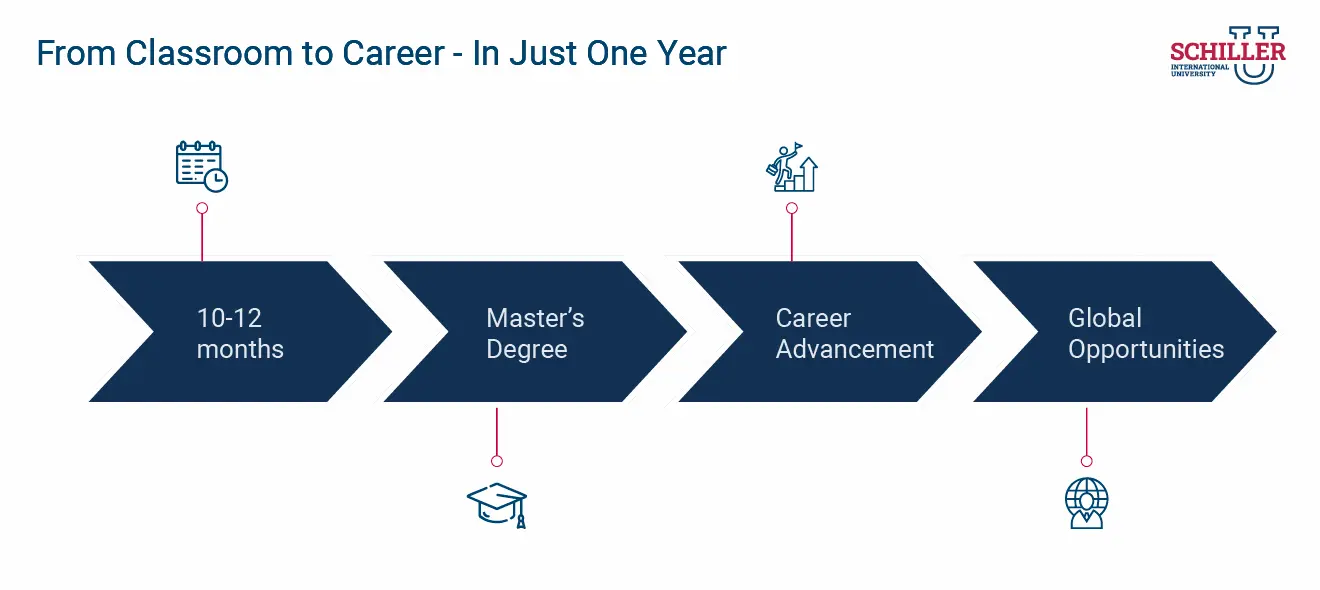You might be asking yourself, 'How long does a master’s degree really take?' especially when you are ready to take the next big step in your academic or professional journey. The truth is, the time you invest in a master’s program shapes not just your study experience, but the speed at which you step into global career opportunities. Understanding how program length fits with your goals helps you plan your next move with confidence and purpose.
Why a Master’s?
Before diving into durations, it is helpful to look at what a master’s degree does and how it differs from your bachelor’s.
- A bachelor’s degree gives you a broad foundation in your field (or across fields), including general principles, theory, and the basics.
- A master’s degree builds depth, specialization, and advanced skills. It is the step where you move from being a generalist to becoming someone who can lead, research, or take strategic roles in your domain.
- Having a master’s can open doors to higher-level positions, leadership, or even doctoral studies later. It often signals to employers that you have a deeper level of expertise and commitment.
A master’s degree lets you specialize, differentiate yourself, and compete for roles that require more than general undergraduate competence.
Typical Duration of Master’s Degrees
In most places, a master’s degree takes between one and two years, depending on many factors. The breakdown of what influences the timing will help you learn more about this advanced qualification:
|
Format Type |
Common Duration |
|
Full-time, taught (coursework and project) |
One to two years |
|
Research-intensive master’s |
Two years or more |
|
Part-time/working student |
Two to three years |
|
Online/flexible pacing |
One to three years (or more) |
|
One-year/accelerated track |
12 months |
Factors Affecting Duration of a Master’s Degree
No two master’s journeys are exactly the same. The time you will spend completing your degree depends on what you study, how you study, and even where you study. Some programs are designed to be intensive and fast-paced, while others allow more time to balance learning with work or personal goals. Understanding these factors helps you choose a study path that matches both your ambitions and lifestyle.
1. Program Focus and Structure:
Professional degrees, such as an MBA or a master's in international business, often follow a clear structure and can usually be completed in one or two years.
2. Mode of Study
How you choose to study can shape your pace. Full-time, on-campus students usually complete their degrees faster, while online or hybrid formats offer flexibility for those balancing work and travel.
3. Academic System and Location
Different countries have different academic calendars and credit systems. In Europe, most master’s degrees typically take one to two years.
4. Personal Pace and Priorities
Finally, your own circumstances matter most. If you are working full-time, studying part-time, or balancing family commitments, you may prefer a flexible schedule that stretches over a few years.
Can You Finish a Master’s Program in One Year?
Yes, many master’s programs today are designed to be completed in just one year, offering an accelerated and efficient path to your next career milestone. These programs combine focused coursework, immersive learning, and real-world application to help you achieve your academic and professional goals faster.
A one-year master’s allows you to stay fully engaged in your studies while quickly transitioning into the global job market. Whether it is a traditional on-campus experience or a one-year online master's degree, these programs are built for motivated students who want to make an immediate impact in their field.

Master’s Programs at Schiller
At Schiller International University, every master’s program is designed to help you grow as a global professional. Our programs combine academic depth, practical learning, and the freedom to study across international campuses or online. Whether you are interested in business, diplomacy, or emerging fields such as digital marketing or sustainability, you can complete your degree in as little as one year while gaining the kind of cross-border perspective employers value.
- Master of Business Administration (MBA)
- MA in International Relations and Diplomacy
- MBA in International Business
- MS in Sustainability Management
- MS in Global Finance
- MS in Data Science
- MS in Digital Marketing and E-Commerce
- MA in International Relations and Diplomacy Online
- Master of Business Administration (MBA) Online
Thanks to Schiller’s intercampus mobility program, you can:
- Study across global campuses in cities like Madrid, Paris, Heidelberg, and Tampa for a truly international experience.
- Accelerate your studies and complete your master’s in one year through focused, full-time formats.
- Personalize your academic journey by aligning your coursework and location choices with your career direction.
Why Duration Matters for Career Planning
The length of your master’s program directly impacts your career trajectory, finances, and life planning.
- Time vs. opportunity: Completing a one-year master’s means re-entering the workforce sooner, turning knowledge into career momentum faster.
- Learning pace: An accelerated format keeps you focused and engaged, allowing you to stay in forward-focused.
- Financial planning: Shorter programs can reduce living costs and minimize income gaps, making your investments more efficient.
- Flexibility and lifestyle: Programs with online or modular options give you the freedom to adapt your studies to your personal and professional life.
- Career alignment: If you are aiming to upskill quickly, shift industries, or accelerate your global career, a one-year program can be the perfect launchpad.
In essence, the duration of your master’s is not just about time. It is about how you use that time to transform your future. At Schiller, the goal is to help you make every month of your master’s count toward real-world growth and career readiness.
Explore Schiller’s master’s programs and see how quickly you can move from learning to leading.
FAQs
Q1. How long does a master’s degree usually take to complete?
Answer: Most master’s degrees take one to two years. The duration of the program typically depends on your study mode, field, and curriculum structure.
Q2. What is the difference between a bachelor’s and a master’s degree?
Answer: A bachelor’s builds foundational knowledge, while a master’s refines your expertise, analytical thinking, and professional skills. It is the step that moves you from understanding concepts to leading projects and making decisions.
Q3. Can a master’s degree be completed in one year?
Answer: Yes. At Schiller, you can complete a master's degree in various disciplines within 12 months.
Q4. Are online master’s programs shorter than on-campus programs?
Answer: Online programs often match the on-campus duration but offer greater flexibility. At Schiller, online formats can help you manage your schedule better, sometimes even accelerate your timeline.
Q5. What career benefits does a master’s degree offer compared to a bachelor’s degree?
Answer: A master’s can open up higher-level roles, improve earning potential, and boost global mobility. It also signals to employers that you are capable of critical thinking, leadership, and specialized expertise.

 Request information
Request information









